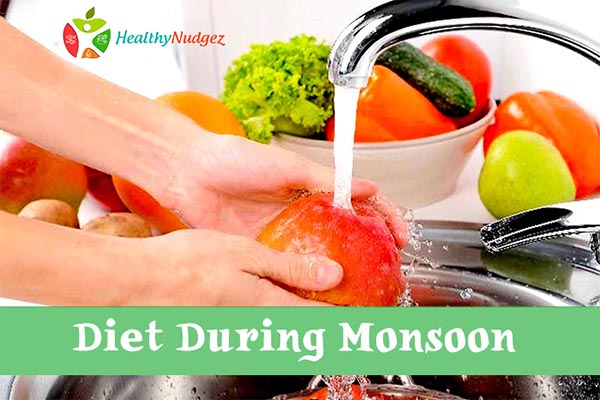Diet During Monsoon
While monsoons are remembered for the wet mud smell, the enchanting rains, the cool breeze, but they also bring along with them some unwanted illnesses like cold, fever, infections, indigestion and much more. One way to keep away from all this by eating healthy food.
The metabolism during this period becomes sluggish. The weakening of the digestive system, can lead to gas formation and indigestion. An individual is also likely to experience loss of appetite.
Monsoon is a season when one needs to have maximum immunity level as the season brings great variety of airborne and water born disease. One tends to have more oxidants or free radicals within the body which must be eradicated through antioxidants. One, therefore, needs to have maximum amount of fruits and vegetables in the diet as the nutrient and antioxidants can drive out oxidants from the body.
Keeping this in mind one needs to make following changes in his diet:
Points to keep in mind
- Wash all fruits and vegetables thoroughly, particularly leafy vegetables and Cauliflower, which not only contain larvae and worms, but also attract dirt from the streets.
- Eat in moderationas the body finds it harder to digest food during the monsoon.
- Drink warm beverages; add mint or ginger or dry ginger powder to tea to boost immunity.
- Moong dalis easy to digest and should be the dal of choice for the season.
- Garlic, pepper, ginger, asafoetida (hing), jeera powder, turmeric and coriander help enhance digestion and improve immunity.
- Non-vegetarians should go in for lighter meatpreparations like soups and stews rather than heavy curries. Avoid eating half boiled non-veg, eggs etc.
- Stick to freshly cooked food,but if you prefer store bought food, heat it before eating.
- Drink only boiled and filtered water, and make sure that it is consumed within 24 hours of boiling.
- Vegetables recommended during the rains are the non-leafy ones such as snake gourd (tori), gourd (dudhi/lauki), pointed gourd (parwal), yam (suran), cluster beans (gavaar), apple gourd (tinda) and bitter gourd (karela).
- It is better to stick to seasonal fruits because non-seasonal ones tend to be infested with worms during the monsoons. Among fruits, stick to pomegranates, mangoes, bananas, apples, litchees and cherries.
- Do not keep cut fruits for longer periods, as they provide favorable environment for bacteria to grow.
- Keep your body hydrated in order to avoid infection and dehydration. Choices for liquids can be lemon water, soups, added flavors to plain water such as roohafza also, avoid juices when it rains, especially from a street vendor.
- You can even go for green tea or herb tea, or ginger tea daily. This will keep you away from catching a cold and will help digest food easily.
- Keep your body light by eating a balanced breakfast, Light Lunch and Dinner. Enjoy some snacking in between with light foods like upma, poha, masala idli or dhokla. Avoid fried and spicy foods.
Monsoon: Foods to avoid during monsoon
- Avoid buying/eating cut fruits and vegetables from outside vendors.
- Do not keep cut fruits for longer, as they provide favorable environment for bacteria to grow.
- Avoid eating chaats, and fried food such as pakoras and juices from roadside vendors.
- When eating out, choose restaurants that conform to basic standards of quality and hygiene, in order to avoid contracting serious infections such as viral fever, diarrhea and other water borne diseases.
- Avoid eating fruits with strong smells like jackfruit, jamun etc. Smelly fruits attract flies, which carry infectious substances.
- While traveling if you are hungry, instead of eating samosas, golgappa, vada pav, etc. go for bhunna channa, homemade chikki, ladoo or whole fruits.
- Don’t purchase vegetables in bulk. Buy only what is required on alternate days to stock fresh vegetables.
- Enhance immunity by eating more vegetables, whole fruits, foods rich in antioxidants, Vitamin A, Vitamin C, Vitamin E, Selenium and B12.
- It is best to avoid salty and heavy food since it promotes bloating and water retention. It is best to avoid table salt as it is high in sodium, which is responsible for high blood pressure.
- Avoid packed namkeens and biscuits because of their high salt and sugar content.
- Wash vegetables with clean water and steam them well, in order to kill germs. Avoid eating uncooked food and salads
- Avoid any semi-solid, liquid-food items and opt for the dry stuff instead. This will reduce the possibility of bacteria in food and hence any infection.
- Try not to have sea foods like fish, prawns, crabs etc until and unless they are fresh. As it is the breeding season for these creatures you may end up having stomach infections or worse food poisoning. It is always good to choose for vegetarian diet during the rainy season.
- Avoid eating mushrooms and sprouts prepared more than a day ago, which increases chances of food poisoning.
- Avoid frequent and repeated heating of food items.
Total Calorie intake during this season should be on the lower side and the diet should have more of vitamins and minerals, should be light with less of oil and spices. In liquids chaach, green tea, soups etc can be included. Foods should be properly cooked and not in semi cooked or raw form
Know More – Best dietician in delhi

